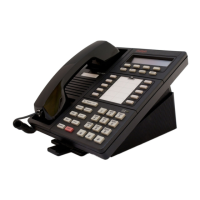MERLIN LEGEND Communications System Release 6.1
Pocket Reference
555-661-116
Issue 1
August 1998
Page 6
Release 6.0 Enhancements (February, 1998)
— All calls transferred from a VMI (voice messaging
interface) port
— Dial-in Tie
Queue control also applies to internal calls to a calling group
and calls to a calling group through the QCC.
Internal calls that dial
or
and are directed to a
calling group programmed as Position-Busy Backup are
eligible for queue control. Calls that come in on a trunk
assigned to the Queued Call Console (QCC) are not eligible
for queue control if the call is directed to a calling group
designated as Position-Busy Backup.
Remote-access calls to a calling group, coverage calls
directed to a calling group, calls directed to calling group
through QCC Position-Busy backup, and all other outside
calls are not eligible for queue control.
— Prompt-Based Overflow
System managers can activate the Prompt-Based Overflow
option. This option allows callers waiting in queue and
listening to a delay announcement to press the # key in order
to reach the overflow receiver for the group, which may be
the QCC queue or another calling group (including a calling
group assigned for a voice mail system).
All three overflow distribution options—based on the number
of calls, the time a caller has waited, and according to the
caller’s prompt—may be used at one time. In this case, time-
based and number-of-calls based options take precedence
over overflow distribution based on the caller’s prompt.
When prompt-based overflow distribution is used, an extra
TTR must be provided for each delay announcement device
assigned to the associated calling group. The delay
announcement informs the caller of the # key option to exit
the queue and leave rather than waiting for an agent. If no
TTR is available when a calling group call arrives, the call is
not sent to a delay announcement extension.
■ Centrex Transfer via Remote Call Forwarding
Centrex Transfer via Remote Call Forwarding can be used in all
system modes of operation to send outside calls to a remote
telephone number or another Centrex station. In this context,
the term
outside calls
refers to calls from outside the
communications system, which may originate at extensions in
the Centrex system but not connected to the local MERLIN
LEGEND Communications System.
An outside call that uses this feature is defined as a call that
arrives on an analog Centrex loop-start line at the MERLIN
LEGEND Communications System. It may arrive directly or be
transferred without consultation or without transfer supervision
(in the case of an automated attendant). The forwarding call to
the outside number is made on the same line/trunk on which the
call arrived, conserving system facilities. The following
considerations and rules apply:
— Only outside Centrex calls are forwarded using this feature.

